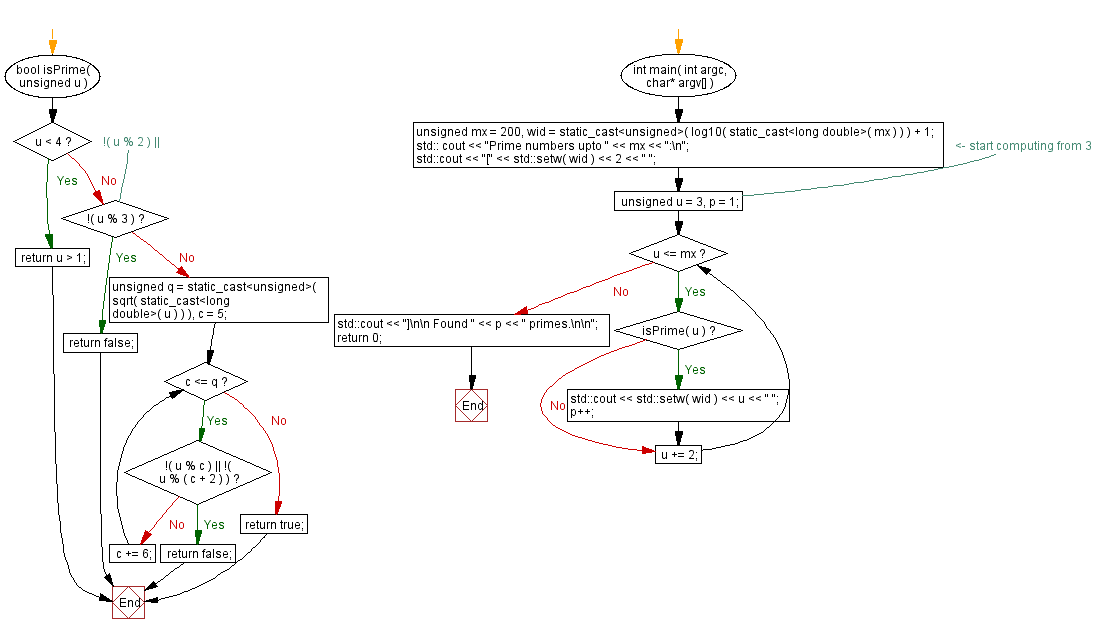C++ Exercises: Generate sequence of primes by means of trial division
35. Generate a Sequence of Primes Using Trial Division
Write a C++ program to generate a sequence of primes by means of trial division.
Trial division is the most laborious but easiest to understand of the integer factorization algorithms. The essential idea behind trial division tests to see if an integer n, the integer to be factored, can be divided by each number in turn that is less than n. For example, for the integer n = 12, the only numbers that divide it are 1, 2, 3, 4, 6, 12. Selecting only the largest powers of primes in this list gives that 12 = 3 x 4 = 3 x 22.
Example: 18 = 2 x 3 x 3
So prime decomposition of 18 is {2, 3, 3}
Test Data:
[ 2 3 5 7 11 13 17 19 23 29 31 37 41 43 47 53 59 61 67 71 73 79 83 89 97 101 103 107 109 113 127 131 137 139 149 151 157 163 167 173 179 181 191 193 197 199 ]
Found 46 primes.
Sample Solution:
C++ Code :
#include <math.h>
#include <iostream>
#include <iomanip>
// Function to check if a number is prime
bool isPrime(unsigned u) {
if (u < 4) return u > 1; // Numbers less than 4 are prime if greater than 1
if (!(u % 3)) return false; // If divisible by 3, it's not prime
// Determine potential divisors
unsigned q = static_cast<unsigned>(sqrt(static_cast<long double>(u)));
unsigned c = 5; // Starting divisor
while (c <= q) {
// Check for divisibility by c and (c+2) to optimize prime checking
if (!(u % c) || !(u % (c + 2))) return false;
c += 6; // Increment c by 6 (skipping multiples of 2 and 3)
}
return true; // If not divisible, the number is prime
}
int main(int argc, char* argv[]) {
unsigned mx = 200; // Upper limit for finding primes
unsigned wid = static_cast<unsigned>(log10(static_cast<long double>(mx))) + 1; // Width for formatting output
std::cout << "Prime numbers up to " << mx << ":\n";
std::cout << "[" << std::setw(wid) << 2 << " "; // Print 2 as the first prime
unsigned u = 3, p = 1; // Start checking primes from 3
while (u <= mx) {
if (isPrime(u)) { // Check if the number is prime
std::cout << std::setw(wid) << u << " "; // Print the prime number
p++; // Increment the prime count
}
u += 2; // Move to the next odd number for efficiency (skipping even numbers)
}
std::cout << "]\n\n Found " << p << " primes.\n\n"; // Display the count of primes found
return 0;
}
Sample Output:
Prime numbers upto 200: [ 2 3 5 7 11 13 17 19 23 29 31 37 41 43 47 53 59 61 67 71 73 79 83 89 97 101 103 107 109 113 127 131 137 139 149 151 157 163 167 173 179 181 191 193 197 199 ] Found 46 primes
Flowchart:

For more Practice: Solve these Related Problems:
- Write a C++ program to generate all prime numbers up to a given limit using trial division and store them in a vector.
- Write a C++ program that iterates from 2 to n and prints each prime number found using a nested loop for division tests.
- Write a C++ program to implement trial division for prime checking and output all prime numbers up to a user-specified number.
- Write a C++ program that reads an integer n, uses trial division to generate primes, and then prints the total count of primes found.
Go to:
PREV : Prime Decomposition of a Given Number.
NEXT : C++ Linked List Exercises Home.
C++ Code Editor:
Contribute your code and comments through Disqus.
What is the difficulty level of this exercise?
